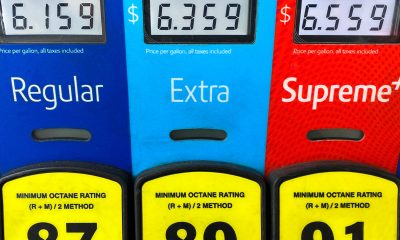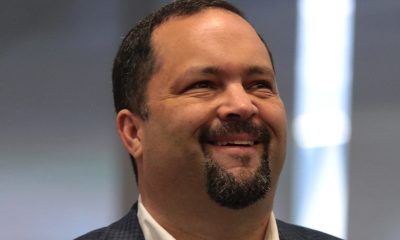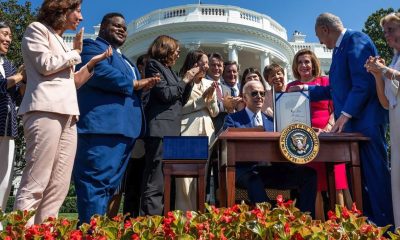Politics
Despite Low Gas Prices, Gas Tax Hike Appears Unlikely

A person gets fuel after gas prices dropped below $2 a gallon at the Quick Mart in High Point, N.C., Wednesday, Jan. 14, 2015. (AP Photo/Daily Free Press, Laura Greene)
JOAN LOWY, Associated Press
WASHINGTON (AP) — The new Republican-controlled Congress is facing an old problem: where to find the money for highway and transit programs.
With gasoline prices at their lowest in years when the new Congress convened, there had been talk that it might be time to raise federal gas and diesel taxes, which haven’t budged in more than 20 years.
But already, GOP leaders are tamping down expectations, leaving no clear solution to the funding problem.
“I don’t know of any support for a gas tax increase in Congress,” Sen. John Cornyn, R-Texas, the No. 2 Senate GOP leader, said flatly. Explained Sen. John McCain, R-Ariz.: “They don’t want to vote for a tax increase.”
House Speaker John Boehner, R-Ohio, while not closing the door entirely, said there aren’t enough votes in the House for a gas tax increase. Rep. Bill Shuster, R-Pa., the House Transportation and Infrastructure Committee chairman, was equally doubtful.
“The president has ruled out a gas tax. I don’t think there’s a will in Congress, and the American people don’t want it,” Shuster recently told The Associated Press.
The gas tax, now 18.4 cents a gallon, and the diesel fuel tax, now 24.4 cents a gallon, were last increased in 1993. In the meantime, Americans are driving less per capita, cars are more fuel efficient and construction costs have gone up. Fuel taxes bring in about $34 billion a year to the federal Highway Trust Fund, but the government spends about $50 billion a year. The trust fund has been the main source of federal transportation aid to states for more than 60 years.
In that environment, two key GOP senators — Finance Committee Chairman Orrin Hatch of Utah and Environment and Public Works Committee Chairman James Inhofe of Oklahoma — had raised the hopes of transportation advocates by saying raising fuel taxes should be considered along with other funding options, using the more politically palatable term “user fees.” But the idea appears to be a long shot at best.
Congress has kept transportation programs teetering on the edge of insolvency since 2008 by repeatedly transferring just enough funds from the general treasury — and making corresponding spending cuts elsewhere in the federal budget — to meet obligations for a few more months or, in one case, as long as two years. Finding acceptable spending cuts to offset the transfers gets more difficult each time.
The latest funding patch cleared Congress last August only about three hours before the Transportation Department said it would begin cutting back aid payments to states. That fix is only expected to last through May, when Congress will be back where it started unless lawmakers act sooner.
“The political support for increasing taxes to pay for transportation appears to be very limited,” said Joshua Schank, president of the Eno Center for Transportation, a think tank.
A majority of Americans think the economic benefits of good transportation outweigh the cost, but they can’t agree on how to pay for new highways or repairs of old ones. An Associated Press-GfK poll last summer, before the plunge in gas prices, showed 58 percent opposed raising federal gasoline taxes to pay for repair, replacement or expansion of roads and bridges. Only 14 percent supported an increase.
The lack of voter enthusiasm for raising gas taxes hasn’t deterred die-hard gas tax supporters who say it is preferable to a one-time fix because it would ensure continued funding. Rep. Earl Blumenauer, D-Ore., issued a statement Thursday saying he intends to reintroduce a bill to raise fuel taxes 15 cents a gallon. He introduced a similar bill last year, but it wasn’t considered by the GOP-controlled House. Blumenauer estimated the increase would raise an additional $210 billion over the next decade.
President Barack Obama has previously rejected a gas tax increase, instead proposing to close corporate tax loopholes and use the revenue to pay for infrastructure. His plan would boost highway spending 22 percent and transit spending 70 percent over four years.
Transportation Secretary Anthony Foxx told a transportation conference this week that’s still the administration’s preferred option, but he also expressed “openness to ideas that emerge from Congress.”
Sen. John Thune, R-S.D., the No. 3 Senate GOP leader, who helped raise speculation that a fuel tax increase might be possible when he said all possible funding options should be considered, including a gas tax increase, this week described such a possibility as “unlikely.”
“I can’t see a scenario for some sort of user fee increase that you’d have to offset with tax relief in some other area,” he told reporters. “Nobody is going to vote for a gas tax increase.”
Instead, Thune said, closing tax loopholes, especially those that encourage corporations to move overseas, and using the money to pay for infrastructure is his “preferred option.” But he also observed that “tax increases are always hard, and there’s a perception that we ought to be able to find savings in other areas to fund infrastructure.”
___
Follow Joan Lowy on Twitter at http://www.twitter.com/AP_Joan_Lowy
Copyright 2015 The Associated Press. All rights reserved. This material may not be published, broadcast, rewritten or redistributed.
Activism
Oakland Post: Week of April 24 – 30, 2024
The printed Weekly Edition of the Oakland Post: Week of April 24 – 30, 2024

To enlarge your view of this issue, use the slider, magnifying glass icon or full page icon in the lower right corner of the browser window. ![]()
Bay Area
MAYOR BREED ANNOUNCES $53 MILLION FEDERAL GRANT FOR SAN FRANCISCO’S HOMELESS PROGRAMS
San Francisco, CA – Mayor London N. Breed today announced that the U.S. Department of Housing and Urban Development (HUD) has awarded the city a $53.7 million grant to support efforts to renew and expand critical services and housing for people experiencing homelessness in San Francisco.

FOR IMMEDIATE RELEASE:
Wednesday, January 31, 2024
Contact: Mayor’s Office of Communications, mayorspressoffice@sfgov.org
***PRESS RELEASE***
MAYOR BREED ANNOUNCES $53 MILLION FEDERAL GRANT FOR SAN FRANCISCO’S HOMELESS PROGRAMS
HUD’s Continuum of Care grant will support the City’s range of critical services and programs, including permanent supportive housing, rapid re-housing, and improved access to housing for survivors of domestic violence
San Francisco, CA – Mayor London N. Breed today announced that the U.S. Department of Housing and Urban Development (HUD) has awarded the city a $53.7 million grant to support efforts to renew and expand critical services and housing for people experiencing homelessness in San Francisco.
HUD’s Continuum of Care (CoC) program is designed to support local programs with the goal of ending homelessness for individuals, families, and Transitional Age Youth.
This funding supports the city’s ongoing efforts that have helped more than 15,000 people exit homelessness since 2018 through City programs including direct housing placements and relocation assistance. During that time San Francisco has also increased housing slots by 50%. San Francisco has the most permanent supportive housing of any county in the Bay Area, and the second most slots per capita than any city in the country.
“In San Francisco, we have worked aggressively to increase housing, shelter, and services for people experiencing homelessness, and we are building on these efforts every day,” said Mayor London Breed. “Every day our encampment outreach workers are going out to bring people indoors and our City workers are connecting people to housing and shelter. This support from the federal government is critical and will allow us to serve people in need and address encampments in our neighborhoods.”
The funding towards supporting the renewal projects in San Francisco include financial support for a mix of permanent supportive housing, rapid re-housing, and transitional housing projects. In addition, the CoC award will support Coordinated Entry projects to centralize the City’s various efforts to address homelessness. This includes $2.1 million in funding for the Coordinated Entry system to improve access to housing for youth and survivors of domestic violence.
“This is a good day for San Francisco,” said Shireen McSpadden, executive director of the Department of Homelessness and Supportive Housing. “HUD’s Continuum of Care funding provides vital resources to a diversity of programs and projects that have helped people to stabilize in our community. This funding is a testament to our work and the work of our nonprofit partners.”
The 2024 Continuum of Care Renewal Awards Include:
- $42.2 million for 29 renewal PSH projects that serve chronically homeless, veterans, and youth
- $318,000 for one new PSH project, which will provide 98 affordable homes for low-income seniors in the Richmond District
- $445,00 for one Transitional Housing (TH) project serving youth
- $6.4 million dedicated to four Rapid Rehousing (RRH) projects that serve families, youth, and survivors of domestic violence
- $750,00 for two Homeless Management Information System (HMIS) projects
- $2.1 million for three Coordinated Entry projects that serve families, youth, chronically homeless, and survivors of domestic violence
In addition, the 2023 CoC Planning Grant, now increased to $1,500,000 from $1,250,000, was also approved. Planning grants are submitted non-competitively and may be used to carry out the duties of operating a CoC, such as system evaluation and planning, monitoring, project and system performance improvement, providing trainings, partner collaborations, and conducting the PIT Count.
“We are very appreciative of HUD’s support in fulfilling our funding request for these critically important projects for San Francisco that help so many people trying to exit homelessness,” said Del Seymour, co-chair of the Local Homeless Coordinating Board. “This funding will make a real difference to people seeking services and support in their journey out of homelessness.”
In comparison to last year’s competition, this represents a $770,000 increase in funding, due to a new PSH project that was funded, an increase in some unit type Fair Market Rents (FMRs) and the larger CoC Planning Grant. In a year where more projects had to compete nationally against other communities, this represents a significant increase.
Nationally, HUD awarded nearly $3.16 billion for over 7,000 local homeless housing and service programs including new projects and renewals across the United States.
Activism
Oakland Post: Week of April 17 – 23, 2024
The printed Weekly Edition of the Oakland Post: Week of April 17 – 23, 2024

To enlarge your view of this issue, use the slider, magnifying glass icon or full page icon in the lower right corner of the browser window. ![]()
-

 Activism4 weeks ago
Activism4 weeks agoOakland Post: Week of March 27 – April 2, 2024
-

 Community2 weeks ago
Community2 weeks agoFinancial Assistance Bill for Descendants of Enslaved Persons to Help Them Purchase, Own, or Maintain a Home
-

 Activism3 weeks ago
Activism3 weeks agoOakland Post: Week of April 3 – 6, 2024
-

 Business2 weeks ago
Business2 weeks agoV.P. Kamala Harris: Americans With Criminal Records Will Soon Be Eligible for SBA Loans
-

 Activism2 weeks ago
Activism2 weeks agoOakland Post: Week of April 10 – 16, 2024
-

 Community2 weeks ago
Community2 weeks agoAG Bonta Says Oakland School Leaders Should Comply with State Laws to Avoid ‘Disparate Harm’ When Closing or Merging Schools
-

 Community1 week ago
Community1 week agoOakland WNBA Player to be Inducted Into Hall of Fame
-

 City Government2 weeks ago
City Government2 weeks agoLAO Releases Report on Racial and Ethnic Disparities in California Child Welfare System























































